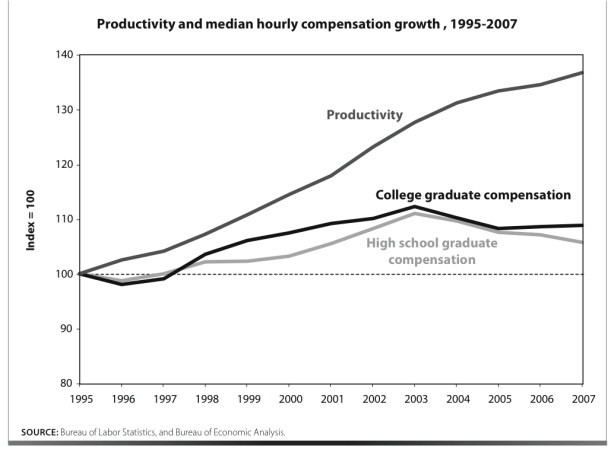Old_Trapper70
Well-Known Member
- Joined
- Dec 17, 2014
- Messages
- 2,383
I agree... everyone is worth more than nine bucks an hour, but that doesn’t mean that everyone is worth more than nine bucks an hour while performing a task that a 15-16 year old could just as easily perform.
Albert Einstein was a moderately gifted dude, but if he rose from the grave, knocked on my door, and asked for a job washing my windows, I’d still only pay him the going rate for residential window washers. Einstein was valuable when he was doing that thing which only Einstein could do (unlocking secrets of the universe, styling his hair to give it that ‘just electrocuted’ look, etc.) but he’d be equally as cheap and expendable as the next guy when doing things that anyone could do.
Yes, but here is another POV on the problem:
http://www.hbs.edu/competitiveness/Documents/growth-and-shared-prosperity.pdf
WHAT IS COMPETITIVENESS?
To generate growth and shared prosperity, the American economy must be competitive. Many people misunderstand the relationship among growth, shared prosperity, and competitiveness, especially because they often use the term “competitiveness” without being clear about what they mean. We find great power in this definition: A location such as the United States is competitive to the extent that firms operating in the United States are able to compete successfully in the global economy while supporting high and rising wages and living standards for the average American.
The definition has two important parts: In a competitive economy, firms win and citizens thrive. If firms in America succeed but the average American struggles, the country is not competitive. Likewise (though this is hard to imagine today), if U.S. citizens were to prosper while American firms languished, the country would not be competitive. To put it differently, competitiveness requires not just prosperity, but also shared prosperity.
Too often, pundits argue that the United States would be more competitive if only wages here were lower. That is simply incorrect by our definition. While lower wages would make it easier for firms in the United States to win in global markets, they would not lift the living standards of the average American. Prosperity would not be shared. If we have to take a national pay cut in order to sell our goods and services abroad, that is not a sign that our nation is competitive. In fact, it’s a sign that we aren’t competitive.
Similarly, some commentators suggest that a cheap dollar would make America more competitive. Again, not as we define the term. A cheap dollar makes U.S. goods and services relatively inexpensive to foreign buyers and therefore boosts U.S.-based firms. But, a cheap dollar makes foreign goods expensive for American citizens and thereby lowers living standards.
The definition of competitiveness focuses attention on a particular national economic goal: high and rising productivity. Only by being highly productive—that is, superior at turning inputs into valuable outputs—can U.S.-based companies simultaneously satisfy customers around the world, pay employees well, and earn a profit.This perspective runs contrary to the view of the many politicians who identify “jobs for jobs’ sake” as the nation’s top economic goal. We agree that America desperately needs more good jobs. But, we argue that good jobs are the results, not the roots, of a competitive economy. If we mistakenly focus on generating jobs for their own sake, we are likely to produce positions that support low living standards or jobs that won’t withstand the pressure of global competition.
In sum, we seek a competitive America in which productive companies enjoy growth and the resulting prosperity
is shared widely

